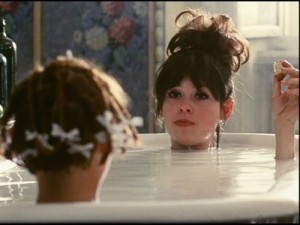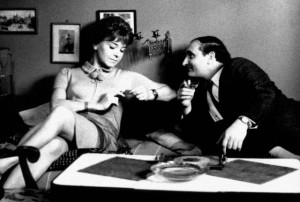STUDIO: Criterion | DIRECTORS: Vera Chytilovà, Jaromil Jires, Jiri Menzel, Jan Nemec, Evald Schorm | CAST: Jitka Cerhova, Ivana Karbanova, Josef Somr, Jan Kacer, Jiri Menzel
RELEASE DATE: 4/24/12 | PRICE: DVD $69.95
BONUSES: essays on each film
SPECS: NR | 513 min. | Foreign language drama and comedy | 1:33 fullscreen | monaural | Czech with English subtitles
Unlike their colleagues in the French and Italian “New Wave” movements, the group of Czech national film school students who were given that same label by critics crafted their works under a repressive government that frequently banned their work. As a result, many of their scenarios were based on literary models, and most are ingeniously allegorical.
Criterion’s excellent four-disc box set, Eclipse 32: Pearls of the Czech New Wave offers a “101” on the film movement (sans Milos Forman and Ivan Passer) by showcasing the seminal anthology Pearls of the Deep (1966), declared an “unofficial manifesto” of the movement in the booklet notes included here. Pearls is packaged with one solo feature by each of the directors who participated in it.
Pearls of the Deep is in itself a good introduction to the movement, as its five segments encompass comedy and drama, purely literary conceits and cinematic ones, and an array of directorial styles, ranging from Neo-realism to delirious fantasy.
The solo works are all tightly constructed — with four of the five running under 82 minutes — and all seem to be directly concerned with issues of personal freedom. The fact that they contain derogatory depictions of authority figures and still got made reminds us of how relatively lenient the Czech Communist government was before the Soviet invasion in 1968 (but two of the films in this collection were banned outright and not seen in the country for decades afterward).
Based on a Milan Kundera novel, the deadly serious The Joke (1969), directed by Jaromil Jires (Valerie and Her Week of Wonders) is a revenge saga involving a man’s imprisonment by the Communist government for sending a joking postcard to his new girlfriend. Even more dramatic is Evald Schorm’s Return of the Prodigal Son (1967), the only slow-moving film in the set. The cyclical plotline — in which a suicidal engineer repeatedly is admitted to and escapes from a mental asylum — is telegraphed very early on.
By comparison, Capricious Summer (1968), directed by Jiri Menzel (Closely Watched Trains) is a playful confection worthy of Bergman or Fellini in the Fifties. The plot, about the ways in which a traveling magician (Menzel) and his pretty assistant entrance and upset the residents of a small town, is delightful, as are the performances of the sextet of lead performers.
The two most radical and entertaining titles in the collection are Jan Nemec’s A Report on the Party and Its Guests and Vera Chytilovà’s Daisies (both 1966). Report is a grimly funny, Bunuel-esque account of a bourgeois picnic that turns into a strange odyssey leading to a strange birthday party in the woods. Totally anarchic in its approach, Daisies follows two pretty young women who decide that, since the whole world is “spoiled,” they too will behave that way. The film is a provocative masterpiece that is both the feminist classic it has been hailed as, and also a pungently crazy slice of Sixties fantasy.
The films in Pearls of the Czech New Wave convey an urgency that transcends the decades and shows what visionary artists can produce, even on the brink of a totalitarian invasion.
|
Buy or Rent Pearls of the Czech New Wave
|
|||
|---|---|---|---|
DVD |
 DVD DVD |
 DVD DVD |
|


Leave a Reply